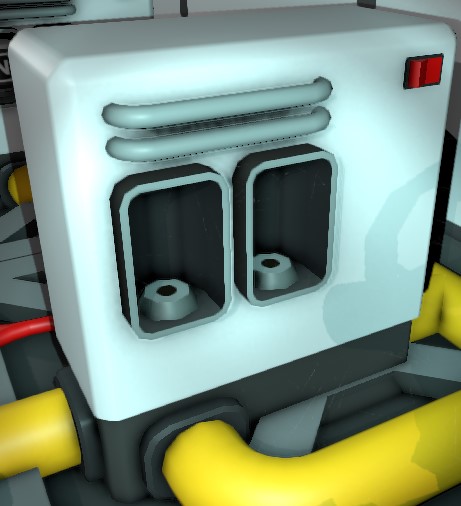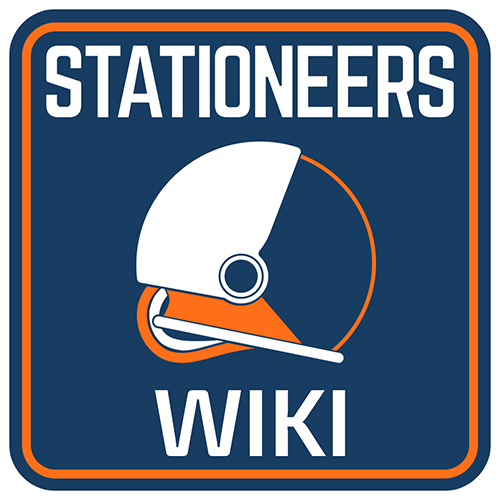Difference between revisions of "Filtration"
From Unofficial Stationeers Wiki
| Line 14: | Line 14: | ||
=Description= | =Description= | ||
Used to separate [[Gas|gasses]] from one [[Pipes|pipe]] network into another using [[Filter|filters]]. Can filter up to two (2) gases at once. [[Guide (Filtration)]] provides additional information regarding the function, construction, and operation of a Filtration unit. | Used to separate [[Gas|gasses]] from one [[Pipes|pipe]] network into another using [[Filter|filters]]. Can filter up to two (2) gases at once. [[Guide (Filtration)]] provides additional information regarding the function, construction, and operation of a Filtration unit. | ||
| + | |||
| + | =Usage= | ||
| + | Place the Kit (Atmospherics) and change the variant to Filtration.<br> | ||
| + | Place [[filter]]s in the machine for what you want to filter out.<br> | ||
| + | There are three filtration pipe connections.<br> | ||
| + | Filtration Input is where you connect the incoming atmosphere to be passed through the Filtration Atmospherics.<br> | ||
| + | Filtration Unfiltered is the remaining mix after extracting whatever the filters did.<br> | ||
| + | Filtration Filtered is the filtered material for which you placed filters in the machine for. | ||
| + | |||
| + | Be aware that the filtration unit unrealistically has an infinitely powerful pump integrated into its output port. That means as long as it is turned on and there is gas to filter out from the input it will pump that filtered out gas into the output pipe network (no matter how high the pressure in that output pipe network already is!). So eventually that pipe network will burst (around 60 MPa) unless you provide some sort of pop-off valve (e.g. a combination of a back-pressure regulator and a passive vent) or use a pipe analyzer and some logic to turn the filtration unit off when a certain amount of pressure is exceeded in the output pipe network. | ||
| + | The filtration system can handle an input gas flow of just over 2.3L from a volume pump. | ||
<!--T:2--> | <!--T:2--> | ||
| Line 83: | Line 94: | ||
<!--T:6--> | <!--T:6--> | ||
==Slot Outputs== | ==Slot Outputs== | ||
| − | + | Slot 0 and 1 are the two gas [[filter]]s. Slot 2 is the [[Integrated Circuit (IC10)|programmable chip]] | |
| − | |||
{| class="wikitable" | {| class="wikitable" | ||
|- | |- | ||
! Output Name !! Data Type !! Description | ! Output Name !! Data Type !! Description | ||
|- | |- | ||
| − | | | + | | Occupied || Boolean || Returns whether the slot is occupied. (0 for no, 1 for yes) |
|- | |- | ||
| − | | | + | | OccupantHash || Integer || Returns the hash of the object in the slot. |
|- | |- | ||
| − | | | + | | Quantity || Integer || Returns the current quantity, such as stack size, of the item in the slot. |
|- | |- | ||
| − | | | + | | Damage || Integer || Returns the damage state of the item in the slot. |
|- | |- | ||
| − | | Class || Integer || | + | | Class || Integer || Returns an integer representing the class of object. |
|- | |- | ||
| − | | | + | | MaxQuanity || Integer || Returns max stack size of the item in the slot. |
|- | |- | ||
| − | | | + | | PrefabHash || Integer || Returns the hash of the structure in the slot. |
|} | |} | ||
Revision as of 08:48, 19 June 2023
 | |
| Operation | |
|---|---|
| Power Usage | 5w |
| Construction | |
| Placed with | Kit (Atmospherics) |
| Placed on | Small Grid |
| Stage 1 | |
| Deconstruction | |
| Deconstructed with | Hand Drill |
| Item received | Kit (Atmospherics) |
Contents
Description
Used to separate gasses from one pipe network into another using filters. Can filter up to two (2) gases at once. Guide (Filtration) provides additional information regarding the function, construction, and operation of a Filtration unit.
Usage
Place the Kit (Atmospherics) and change the variant to Filtration.
Place filters in the machine for what you want to filter out.
There are three filtration pipe connections.
Filtration Input is where you connect the incoming atmosphere to be passed through the Filtration Atmospherics.
Filtration Unfiltered is the remaining mix after extracting whatever the filters did.
Filtration Filtered is the filtered material for which you placed filters in the machine for.
Be aware that the filtration unit unrealistically has an infinitely powerful pump integrated into its output port. That means as long as it is turned on and there is gas to filter out from the input it will pump that filtered out gas into the output pipe network (no matter how high the pressure in that output pipe network already is!). So eventually that pipe network will burst (around 60 MPa) unless you provide some sort of pop-off valve (e.g. a combination of a back-pressure regulator and a passive vent) or use a pipe analyzer and some logic to turn the filtration unit off when a certain amount of pressure is exceeded in the output pipe network. The filtration system can handle an input gas flow of just over 2.3L from a volume pump.
Characteristics
- It has a manual power switch.
- It consumes 10W of Power per Tick when idle and 44W when active.
- It has a separate Power Port and Data Port.
- It has a pipe port (labelled "Input") for the gas mixture from which the designated gas(es) will be filtered.
- It has a pipe port (labelled "Filtered") for the designated gas(es) that have been filtered.
- It has a pipe port (labelled "Unfiltered") for any remaining unfiltered gases.
- It can filter up to 2 different gases at once by inserting two different filters.
Note: When using an I/O slot reader chip, the filter slots are labeled as slot 1, slot 2 and slot 3(IC), with 1 being the slot closer to the inlet. When using an IC chip, the slots are labeled as slot 0, slot1 and slot 2(IC).
User Interface
A Filtration unit provides the following user interface:
| Name | Type | Function |
|---|---|---|
| Filter (Right) | Slot 0 | Port for a gas filter. If gas of the same type is present in the incoming mixture, it will be redirected out the "Filtered" pipe port. |
| Filter (Left) | Slot 1 | Another Port for a gas filter that functions the same as its twin slot. May contain the same or a different filter. |
| v | Slot 2 | IC10 placed in filtration unit (has 2 Input/Outputs) |
| On | Switch | Switches Filtration unit between turned on or turned off. (On=1/Off=0) |
Data Network Properties
These are all Data Network properties of this device.
Data Parameters
These are all parameters that can be written with a Logic Writer, Batch Writer, or Integrated Circuit (IC10).
| Parameter Name | Data Type | Description |
|---|---|---|
| On | Boolean | Powers on the Filtration unit on when set to 1. Powers off when set to 0. |
| Open | Boolean | |
| Setting | Integer | |
| Lock | Boolean | |
| Mode | Boolean | 0: idle, 1: Active |
Data Outputs
These are all parameters, that can be read with a Logic Reader or a Slot Reader. The outputs are listed in the order a Logic Reader's "VAR" setting cycles through them.
| Output Name | Data Type | Description |
|---|---|---|
| Power | Boolean | Returns whether the Filtration unit is turned on and receives power. (0 for no, 1 for yes) |
| Error | Boolean | Returns whether the Filtration unit is flashing an error. (0 for no, 1 for yes) |
| Lock | Boolean | Returns whether the Filtration unit is locked. (0 for no, 1 for yes) |
| On | Boolean | Returns whether the Filtration unit is turned on. (0 for no, 1 for yes) |
| RequiredPower | Integer | Returns the current amount of power in Watts required by the Filtration unit. |
| Quantity | Integer | Returns the current amount of Filter remaining. Slot 0 (Right), slot 1 (Left). |
Slot Outputs
Slot 0 and 1 are the two gas filters. Slot 2 is the programmable chip
| Output Name | Data Type | Description |
|---|---|---|
| Occupied | Boolean | Returns whether the slot is occupied. (0 for no, 1 for yes) |
| OccupantHash | Integer | Returns the hash of the object in the slot. |
| Quantity | Integer | Returns the current quantity, such as stack size, of the item in the slot. |
| Damage | Integer | Returns the damage state of the item in the slot. |
| Class | Integer | Returns an integer representing the class of object. |
| MaxQuanity | Integer | Returns max stack size of the item in the slot. |
| PrefabHash | Integer | Returns the hash of the structure in the slot. |
